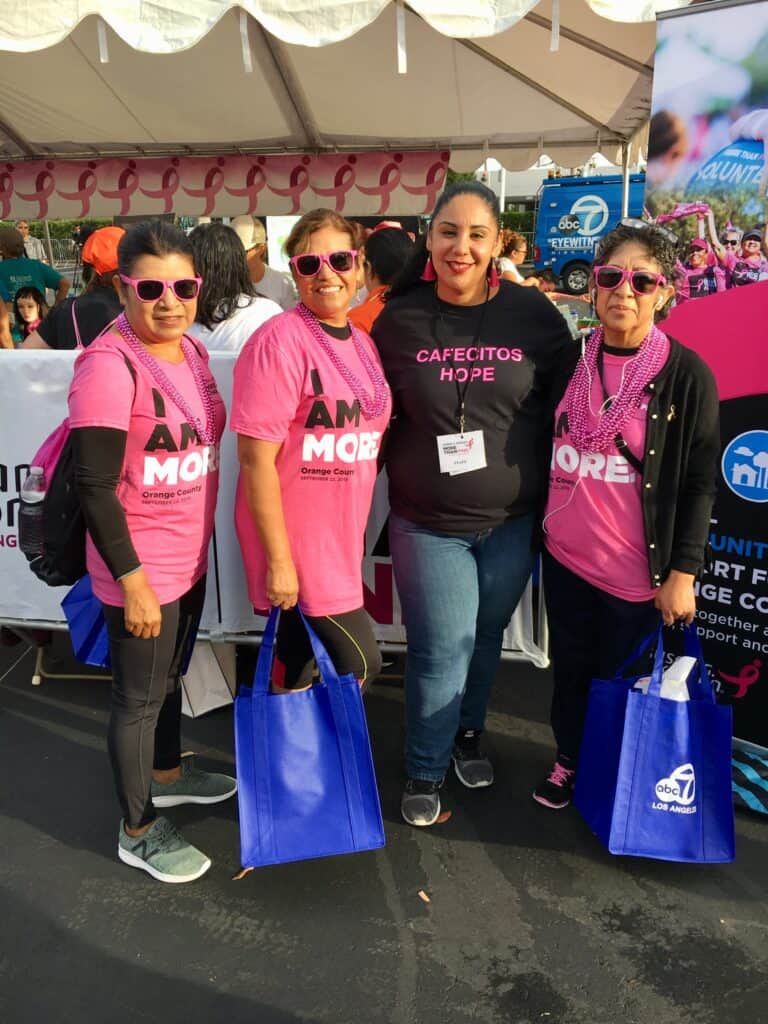
Ambrocia Lopez is a Susan G. Komen Community Education and Outreach Manager. She’s been with Komen for 12 years. In her current role, Ambrocia is responsible for outreach, partnership development, education and training programs to promote the Patient Care Center and other mission initiatives and educational programs.
Breast cancer impacts women the most, and I’ve always been a huge supporter of community health and women’s health. For the past 20 years, I’ve run community health programs. It’s my passion. Coming from a low-income community, using grassroots programs, like the ones I advocate for, are really important to me.
I have breast cancer in my family. Aunts on both sides have passed away, and my father currently has metastatic prostate cancer, so there’s a strong family connection. That’s why I’m so passionate about the work I do.
As a woman and a mother, making sure people are aware of the resources available about breast cancer and linking them to those resources is important to me. We need to make sure that people have access to the resources they need and that those resources are in their communities. We need to take action so we can improve their health outcomes.
I understand. I grew up with cultural barriers and socioeconomic barriers. This is why I have passion for the work I do – because I know we in the Latino community are dying, and we shouldn’t be dying. I want to answer that question: Why are we dying? What are the things that are creating the differences between the white community and us, what is beyond genetics? What are the social determinants, the cultural factors that impede timeliness to care and create those barriers?
I think for Black and Latino communities, we have similar barriers, so how do we communicate this message to these communities to make them take action? And then how do I provide the resources that are going to improve their health outcomes in a timely manner? I’ve always said, health equity goes beyond your skin color. It’s being uninsured, having a lower income, not having the right access. These factors impact if you are getting timely care, an early diagnosis, and increased survival.
There’s also a fear associated with socioeconomic factors. People worry if they are diagnosed, they can’t work and if they can’t work, they can’t pay rent.
Within the Latino community, we have this concept of fatalism. “I’d rather not know, because if I know I have cancer, I’m going to die.” We need to change this whole connection between cancer and dying. People need to understand you don’t always die from a breast cancer diagnosis. We can’t prevent breast cancer, but we can lower our risk. Or we can find it early when there are ways of treating this disease.
My mother is an example of this. She had a lump in her breast and was going to get a biopsy, but in her head, she was already dying of breast cancer, because she didn’t know a lump could be benign, too.
There’s a lack of knowledge about breast health. In my mother’s instance, you have an immigrant woman who hadn’t been exposed to information about breast cancer, so she didn’t know tumors could be benign. She didn’t have a mammogram until she was in her 50s, even though there’s a strong family history, so we need to do what we can to educate these communities who maybe don’t have the literacy, the health literacy, the access to care.
Often with communities of color, everything is word of mouth. We tell stories to each other. Cultural myths are still shared. It’s like our communities either don’t talk about it or they only talk about the negative. “She had cancer and died” or “She had cancer and her husband left her.” What we need to say instead of the negative is, “Well, she had cancer, and it was hard, but look at her now.”
This is why representation is important, because we need someone undergoing treatment to see a survivor and say, “She looks like me, and she is surviving. Not everybody dies of breast cancer.”
It’s important to spread the word about Komen to our communities – what we are, what we do, what resources we have available. Komen has great programming, including programs that are health equity driven.
Our website has research-based resources, educational resources, webinars, and our resources are culturally appropriate. We need these communities to know we have social and mental help through our helpline. We have information on free mammograms or screenings and diagnostic programs. We have financial assistance programs.
Get a screening. If there’s nothing wrong, you have peace of mind. If there is something, we provide resources. We can help you with those next steps. We’re there along the way, we’re there at the different touch points. We have programs all along the way – screening, diagnostics, navigation, financial assistance.
We are dying and we should not be dying. We need our communities to know we are here for them. Breast cancer is scary, but we are here to help and to explain what’s happening. That’s the power of Komen – engaging the community in all the different facets of the continuum of care.




